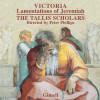Texte paru dans: / Appeared in:
*

GRAMOPHONE (05/2010)
Pour s'abonner /
Subscription information
Gimell
CDGIM043

Code-barres / Barcode:
0755138104327 (ID31)
Consultez toutes les évaluations recensées pour ce cd
~~~~ Reach all the evaluations located for this CD
Reviewer: Richard
Lawrence
Victoria's Lamentations were published in 1585, in a volume that contained the Responsories and other pieces for Holy Week. Composed for Matins on the three days preceding Easter Sunday, they were not intended to be sung straight through; but, as Peter Phillips remarks in his bookletnote, the progression from four-part to eightpart writing makes a satisfying musical experience on a recording.
Phillips also notes the oddity of the "potentially bright sound" of the scoring adopted by Spanish composers for Requiems and Laments. It's surprising, therefore, that he transposes some pieces up by a tone. Others are down by as much as a minor third. But the higher pitch sounds perfectly appropriate where, for example, Victoria uses the top three parts to represent the city ofJerusalem weeping at night. There is a similarly appropriate lightening of the texture - but at a lower pitch at "Pupilli facti sumus" ("We are orphans").
Although much of the writing consists of slowmoving chords, there is plenty of counterpoint: the two come together, so to speak, in the canonic opening to the first Lamentation's ''Jerusalem, Jerusalem". The corresponding section of the second Lamentation also opens in canon. Here, and in three of the others, there are two ''Jerusalem''settings. They were probably intended to be alternatives, but in each case Phillips generously gives us both.
Apart from some slight curdling of the tone in the sopranos, the performances are as impeccable as you would expect, without being bloodless. From the New World, the Padilla makes a worthy bonus.
Cliquez l'un ou l'autre
bouton pour découvrir bien d'autres critiques de CD
Click either button for many other reviews


